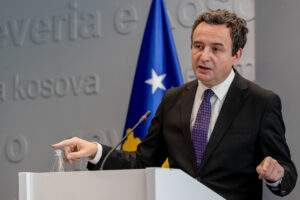BRUSSELS — Hopes for a breakthrough in the Kosovo-Serbia dialogue were dashed once again as the anticipated tripartite meeting in Brussels failed to materialise. Josep Borrell, the European Union’s High Representative for Foreign Affairs and Security Policy, and Miroslav Lajcakk, the EU Special Representative for the Belgrade-Pristina Dialogue, met separately with Kosovo’s Prime Minister Albin Kurti and Serbia’s President Aleksandar Vucic. Despite the promise of a tripartite discussion, the meeting never occurred.
Borrell attributed the impasse to Kosovo’s lack of readiness, citing three conditions set forth by Kurti for further engagement in the normalisation process. Kurti’s conditions include the formal signing of the Basic Agreement by the respective heads of government, the withdrawal of a December 13 letter from former Serbian Prime Minister Ana Brnabic, and the handover of the criminal Milan Radoicic and his paramilitary group to Kosovo’s judicial authorities.
“Kosovo was not willing to hold the tripartite meeting, while Serbia was ready,” Borrell stated at a press conference following the bilateral meetings. “It takes two to tango, and unfortunately, no progress could be achieved today. Prime Minister Kurti has presented three conditions for their continued engagement in the normalisation process. I quote: ‘1. The Basic Agreement must be formalised with signatures from the respective heads of government. 2. The withdrawal of the deportation reservation letter from the former Serbian Prime Minister dated December 13. 3. The handover of Milan Radoicic and his paramilitary terrorist group to Kosovo’s judicial authorities.'”
Borrell emphasised that both parties bear responsibility for failing to meet their commitments. “No steps have been taken towards establishing the Association. The European draft statute offers a modern way to address this issue. It should not be forgotten that the normalisation process advances quickly if both parties agree. The EU and the US cannot desire the normalisation of relations more than Kosovo and Serbia themselves. Today we had another meeting. The discussions were, as expected, difficult as always,” he remarked.
Before the meeting, the EU presented a new proposal for the implementation plan, aiming to guide the process forward. However, the conditioning of the implementation did not allow the discussion to focus on how to proceed, leaving the parties far apart.

Prime Minister Kurti, speaking after the meeting, reiterated his stance on the conditions set for further bilateral discussions with President Vucic. He stressed that the Kosovo government had made its position clear regarding the implementation of the Basic Agreement, which was agreed upon in February 2023.
“We consider the Basic Agreement and its Implementation Annex a distinguished achievement in foreign policy, as well as a significant accomplishment for the EU, which has mediated several rounds of this dialogue. The last trilateral meeting was on September 14 last year… Much has happened since then, including the Banjska attack and the letter of withdrawal from the Basic Agreement,” Kurti said.
Kurti emphasised the need for Radoicic, the organiser of the Banjska attack, to be handed over to Kosovo authorities, stating, “Otherwise, normalisation and peace in the region will not occur.” He also insisted on the full implementation of agreements with Serbia and the withdrawal of reservation letters.
“These letters are ancillary, direct assaults on the Basic Agreement. We will attempt in early July to discuss sequencing. What we did today was protect the Basic Agreement… The attack comes from the lack of signature on the agreement, from Brnabic’s letter, and from the non-surrender of Radoicic, who continues his training for new attacks in Serbia,” Kurti added.
“The Basic Agreement centres on at least de facto recognition. We cannot allow the Basic Agreement to be sidelined by making the Association an urgent issue… We do not deny the legacy of previous governments but must protect the Basic Agreement,” Kurti concluded.
The deadlock in Brussels underscores the ongoing challenges in the Kosovo-Serbia dialogue, with both sides entrenched in their positions. As the EU and US continue to mediate, the path to normalisation remains fraught with obstacles, demanding unwavering commitment and substantial concessions from both parties.
Western Appeasement Enables Serbian Aggression in Kosovo
Western envoys’ appeasement of Serbia, aligned with Kremlin interests, undermines Kosovo’s sovereignty. This policy shift jeopardises stability, democracy, and the rule of law in the Balkans.

LONDON, by Vudi Xhymshiti — The enduring troubles between Kosovo and Serbia can be traced back to a turbulent history, deeply rooted in ethnic tensions and brutal conflicts. The late 1990s saw a horrifying campaign of ethnic cleansing by Serbian forces, which led to the intervention of NATO and the eventual declaration of independence by Kosovo in 2008. This backdrop of violence and strife has profoundly shaped the political landscape of the Balkans, fostering a climate of mistrust and hostility that persists to this day.
Recently, the situation has been exacerbated by the actions of Western envoys such as Josep Borrell, Miroslav Lajcakk, and Gabriel Escobar, who, rather than upholding the principles of democracy and international law, have appeared to appease and enable Serbia’s territorial and constitutional aggression against Kosovo. The case of the Banjska attacks, where armed Serbian factions carried out violent acts in Kosovo, underscores this troubling dynamic. Despite clear evidence and intelligence indicating Serbia’s involvement, Western powers have largely turned a blind eye, allowing Serbia to evade accountability.
Kosovo and the United States have long been partners and allies. However, recent shifts in US foreign policy have seen a disconcerting pivot towards supporting Serbia, a nation that has aligned itself with the Kremlin following a 2022 agreement to synchronise its foreign policy with Russia. This alignment is starkly evident as Serbia continues to resist Western-imposed sanctions against Russia, despite the latter’s invasion of Ukraine in February 2022. The US seems intent on courting Serbia, possibly in an attempt to pry it away from Russian influence, but this approach overlooks the inherent risks and the destabilising impact on the Balkans.
In November last year, Kosovan Serbs, directed by Belgrade, boycotted local institutions in northern Kosovo. This boycott followed Kosovo’s decision to mandate that vehicles be registered with Kosovan, not Serbian, licence plates—a move seen as essential to affirming Kosovo’s sovereignty. The response from Serbia was aggressive; militia factions backed by Belgrade attacked local election offices, forcing the postponement of elections initially scheduled for December.
Tensions escalated further when Kosovan police arrested Dejan Pantic, a former police officer implicated in terrorism and actions against Kosovo’s constitutional order. Belgrade’s response was swift, orchestrating roadblocks across northern Kosovo and whispering about an attempt to declare an autonomous republic within Kosovo. Despite international pressure to remain passive, Kosovo prepared its armed forces to remove the roadblocks and restore order. This show of determination by Pristina pressured Serbian President Aleksandar Vucic to back down, albeit temporarily.
Negotiations in Brussels and later in Ohrid, North Macedonia, failed to yield concrete results, primarily due to Serbia’s refusal to sign agreements, a stance mirrored by Prime Minister Albin Kurti who also refused to sign without assurances of implementation. Despite verbal commitments, Serbia continued to flout all previous agreements. Vucic’s subsequent declarations on Serbian television, refusing to implement any agreed terms, were met with silence from both the EU and the US, who instead increased pressure on Kosovo.
In April 2023, as Kosovo prepared for local elections, Serbia orchestrated a covert operation, importing armed militia factions in another attempt to declare an autonomous republic. Intelligence sources indicate that international powers were aware of these movements but chose not to intervene. The reluctance of the international community to defend Kosovo’s territorial integrity allowed Serbia to push its aggressive agenda.
The culmination of these tensions was the violent clash in September 2023, where heavily armed Serbian forces attempted to seize control of northern Kosovo. Despite clear evidence of Serbia’s direct involvement, Western powers, excluding the UK, continued to demand that Kosovo de-escalate, effectively undermining Kosovo’s legitimate right to defend its territory and constitutional order.
Serbia’s actions, reminiscent of Russia’s tactics in Crimea, have included the use of paramilitary groups dressed in plain clothes to carry out their missions of aggression. The Western community’s failure to hold Serbia accountable, combined with a policy of appeasement, has only emboldened Serbia. This policy has had dire consequences, including the ethnic cleansing of Albanians within Serbia, facilitated by administrative orders to nullify their addresses and strip them of their citizenship and rights.
The recent history of crimes and war crimes committed by Serbian forces, under the regime of Slobodan Milosevic and now under the leadership of Aleksandar Vucic, who served as Milosevic’s propaganda minister, serves as a grim reminder of the brutality that Kosovo has endured. The US Department of State’s documentation of these atrocities, including the systematic campaign of ethnic cleansing, looting, burning of homes, use of human shields, and mass executions, paints a harrowing picture of Serbia’s actions.
As Kosovo continues to stand firm against these aggressions, it is crucial for the United States and the European Union to reassess their approach. The current policy risks losing the support and sympathy of the Kosovan people and jeopardising decades of investment in the region’s stability. The US and EU must uphold the principles of democracy and the rule of law, ensuring that Serbia is held accountable for its actions. Failure to do so will not only undermine Kosovo’s sovereignty but also embolden other authoritarian regimes aligned with Kremlin interests. The time for decisive action is now, before it is too late.


